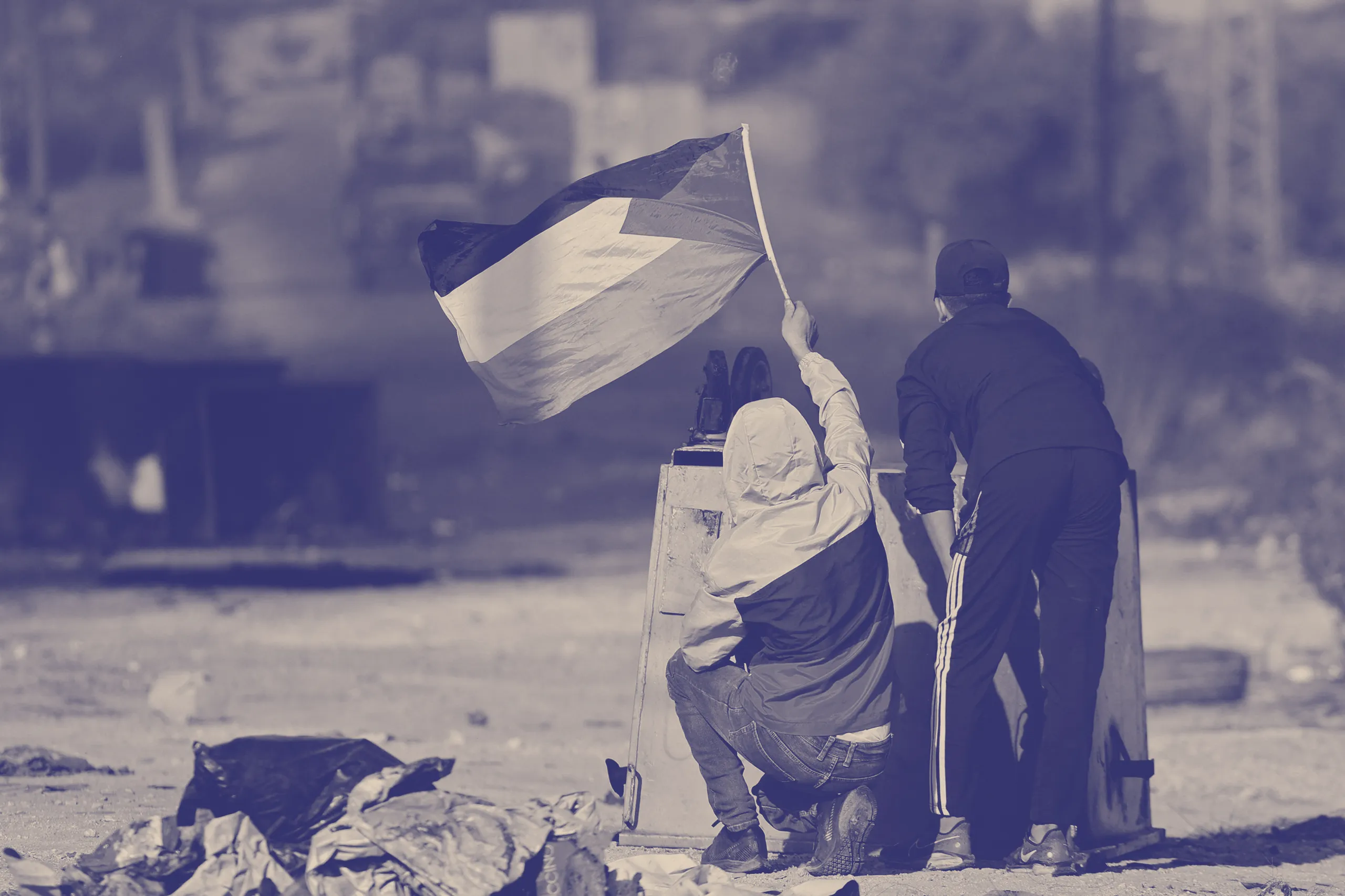Under the night sky of a West Bank village, a Palestinian and an Israeli sit together, reflecting on the future.
They question whether Basel will ever be free to visit Yuval’s home in Israel, if Basel’s village will be granted building permits, and whether they will ever experience lasting stability.
For years, these two friends have documented the destruction of homes, wells, and schools by the Israeli army, following court rulings that declared Basel’s community illegal. As they film, they cling to the hope that their work might change the reality they are living in.
Now, that hope has reached some of the world’s biggest stages.
No Other Land Gains Global Recognition
The documentary No Other Land has been nominated for both an Oscar and a BAFTA for Best Documentary Feature.
The film chronicles the struggle over Masafer Yatta, a cluster of about 20 Palestinian villages, and explores the friendship between Palestinian activist Basel Adra and Israeli journalist Yuval Abraham.
In the film, Basel narrowly escapes detention following a protest, his father is arrested, and a soldier shoots a community member in the neck while confiscating a generator—an injury that leads to paralysis and death.
“It’s scary,” Yuval told the BBC, acknowledging the film’s success in raising awareness but noting that those in power have yet to take sufficient action.
“I don’t have an illusion that films are going to change the world,” he added. “But I know they can change individuals, and I know they can be part of a bigger change—and we really need this now.”
The documentary was five years in the making, created by Basel Adra, Yuval Abraham, Hamdan Ballal, and Rachel Szor.
The Tragedy Behind the Story
The film delves into the broader context of the Israeli occupation of the West Bank, which began in 1967. Under international law, Israeli settlements in the region are illegal, though Israel disputes this. Over the past 55 years, settlements have expanded, fueling violence and disputes over land.
The Israeli military maintains that demolitions in Masafer Yatta are part of operations against illegal construction. When asked about the man who was shot and paralyzed, the IDF stated that their investigation found no wrongdoing, claiming that two Palestinians had grabbed a soldier’s weapon and vest, leading to the gunshot.
However, Palestinian eyewitnesses told Israeli media that they were never contacted as part of the investigation and believe the shooting was intentional.
Following the October 7, 2023, attack by Hamas—which killed about 1,200 people and resulted in 251 hostages—Israel launched a military campaign that has killed at least 47,500 people in Gaza, according to the Hamas-run health ministry.
Since then, violence in the West Bank has escalated:
- 13 Palestinians have been killed by settlers (UN reports).
- More than 850 Palestinians—many of them militants—have been killed by Israeli troops (Palestinian health ministry).
- 30 Israelis have been killed by Palestinians in the West Bank (UN data).
- 1,420 incidents of Israeli settler violence were recorded in 2024—the highest since UN records began in 2006.
Political Implications and Rising Tensions
The film highlights how political shifts influence violence in the region. Basel noted that settler attacks have intensified since the return of Donald Trump to power.
Trump has lifted sanctions imposed by the Biden administration on some settlers. His ambassador to Israel, Mike Huckabee, has stated that Israel has a “title deed” to the West Bank, claiming that “there’s no such thing” as occupation or settlements.
When asked if the US should recognize Israeli sovereignty over the West Bank, Trump said he had yet to decide but promised an announcement in four weeks.
The History of Masafer Yatta’s Displacement
The conflict over Masafer Yatta dates back to the 1980s, when Israel declared the area a closed military firing zone, prohibiting Palestinians from living there.
Notes from a 1981 Israeli government meeting reveal that Ariel Sharon, then the Agriculture Minister, proposed using military zones to prevent Palestinian expansion into the desert.
Israel maintains that Palestinians did not reside there permanently before the ruling. However, Palestinians presented a 1945 map showing that their communities had existed there for generations.

In 2022, Israel’s Supreme Court ruled in favor of the government, allowing the demolition of homes and the expulsion of over 1,000 villagers.
No Other Land captures these events in devastating detail, showing:
- Bulldozers leveling a primary school
- A truck filling a well with mud
- Villagers confronting soldiers as their homes are crushed
A tearful young girl asks her mother where they will go. Her mother responds: “We have no other land.”
A Story of Friendship and Inequality
Beyond the politics, the film explores the deep yet unequal friendship between Basel and Yuval.
Despite sharing similar values and being of the same age, their realities differ starkly:
- Yuval, as an Israeli, can travel freely across Israel and the West Bank.
- Basel, as a Palestinian, cannot enter Israel without a permit due to Israeli security regulations.
At one point, Basel reflects on his frustration: despite studying law, he could only find work in Israeli construction. He confesses, “When I think about it too hard, I feel this huge depression.”
The film does not shy away from uncomfortable questions. One Palestinian confronts Yuval:
“How can we remain friends when you come here, and it could be your brother or friend who destroyed my home?”
Yuval acknowledges his complicity, saying: “At the end of the day, the fuel in the bulldozers is my tax money.”
International Reactions and Controversies
At the Berlin Film Festival, Yuval’s acceptance speech sparked controversy when he described the situation as “apartheid” and called for a ceasefire in Gaza.
- Germany’s Culture Minister condemned the remarks as “shockingly one-sided” and “deeply hateful toward Israel.”
- Berlin’s mayor called it an “intolerable relativization.”
- Israel’s public broadcaster labeled his comments antisemitic.
Yuval, who has received death threats, rejects the accusation. “Most of my family was killed in the Holocaust,” he told the BBC. “Learning from history should tell us to fight dehumanization—no matter who the victim is.”
A Film Without a US Distributor
Despite winning multiple international awards, No Other Land has yet to secure an official US distributor—a rarity for an Oscar-nominated documentary.
One of the film’s final scenes, recorded on October 13, 2023, shows Basel’s cousin being shot in the stomach by a settler, his hands appearing empty. Other footage captures settlers throwing rocks at homes while soldiers watch.
The IDF confirmed the shooting case was referred to the state attorney’s office, but declined to comment further.
The Fight Continues
Basel remains in Masafer Yatta, where settlers hold “unlimited power” and violence persists.
- In January, a 72-year-old Palestinian was hospitalized after being beaten with sticks.
- Around 15 people were arrested while grazing sheep or defending their land from settlers.
The UK government has sanctioned settler groups linked to violence, with a Foreign Office spokesperson stating: “Israeli ministers must clamp down on settler violence and halt settlement expansion.”
Yuval insists: “There is no way forward other than a fair political solution where Palestinians can be truly free.”
The documentary ends with Basel’s words: “One drop of water doesn’t make change, but keep dropping water, and it will.”


